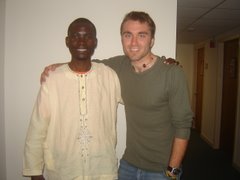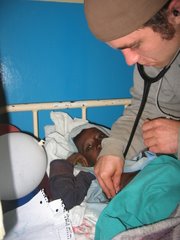Friday 9 Feb, 2007 - 21:38 – Kigali
In January, 2005 I drove to Chicago to see “Hotel Rwanda” and cried in the theater. It was a powerful movie that, oddly enough, left me feeling good – like I was noble for caring, seeing it and becoming educated. As the credits rolled I remained frozen, eyes glued to some nonexistent point beyond the screen. I thought I understood.
Two years later, with all sorts of eagerness, I set foot in Hotel Des Milles Collines – the real Hotel Rwanda, an icon of the country and of genocide in the minds of the West. I do not fully know what I was anticipating: something difficult to swallow yet wholesome, something about finality and closure. Part of it was an expectation to be grounded in my humanity – as if being there, in the shadow of a nightmare, might cause me to better appreciate my own evil potential in a broken world. And if I could understand that, then maybe I could recognize its early developments, suppress them, and be good.
But the shearing between what I expected and what I experienced left me raw. It was a remarkable moment, realizing I had been conned. Although the Hollywood film portrays genocide, it dawned on me that the movie is really about hope and positivity; a hero who lives, a family that is reunited, and an ending that is uplifting. But being here, in Rwanda, I realize there was nothing good about genocide, and the ending is not uplifting.
I see the ending on the streets, in the papers, and even still in the health care system. Just last week a little boy was admitted to my hospital with a machete-severed forehead; some one did not want his father to testify to accusations of genocide crimes from thirteen years ago, so they attacked his family. Yesterday I passed a three-year old begging on the streets – alone. Americans cannot handle that ending. It doesn’t make the movies; it doesn’t make the news. We hear all the positives about the Gacaca system, but in truth it is a mockery of justice. Cold-blooded murderers stand in front of their victims’ families and deny the pain they caused, meanwhile their friends cut foreheads, shatter windows, and threaten potential witnesses that can challenge the lies.
If you have enough courage to face truth and want to understand Rwanda in 1994, set aside Hollywood’s entertainment for a BBC film called “Shooting Dogs”. It does not hide or hype, it just tells. The film, shot on location, is so raw and numbing I could not even cry, but only sit and shake, and feel spasms throughout my chest. It will leave you silent and sober, but strangely alive, aware, and appreciative for your privilege. If you do take up my challenge, please send me an email after the movie.
I still think Hotel Rwanda is a good film, but it is not valid if you are trying to understand what took place outside, or even within, the confines of the hotel. Rwandans say it selectively leaves out details from its own story that they find appalling. The toughest one being that only Tutsis who could pay were saved. In fairness, I have no qualm with Paul Rusesabagina’s pragmatic decision, because he used the money to bribe Hutu leaders – but Rwandans think the film makes a hero out of an ignoble man. Thus, they voted him the 2006 Villain of the Year (The New Times, 1 Jan, 2007).
As grim as I’ve been, I should say that not all is lost. Hutu and Tutsi are now terms only used in private conversation; in public Rwandans exist without distinction. People are trying to move on. And it is also true that Hutus and Tutsis work and live together, however this is only made possible with conscious ignorance and chosen forgetfulness. They all know pockets of violence and unhealable wounds remain throughout their Rwanda. At the moment, this appears to be the ending that Don Cheadle’s film left out. But maybe it is just the middle of a longer story. Maybe with the influx of NGOs and humanitarian aid, and with efforts to move forward, necrotic wounds will fall off and instead of living their history, the generation after the next generation will tell it only as a story. At least, that is my hope.
In January, 2005 I drove to Chicago to see “Hotel Rwanda” and cried in the theater. It was a powerful movie that, oddly enough, left me feeling good – like I was noble for caring, seeing it and becoming educated. As the credits rolled I remained frozen, eyes glued to some nonexistent point beyond the screen. I thought I understood.
Two years later, with all sorts of eagerness, I set foot in Hotel Des Milles Collines – the real Hotel Rwanda, an icon of the country and of genocide in the minds of the West. I do not fully know what I was anticipating: something difficult to swallow yet wholesome, something about finality and closure. Part of it was an expectation to be grounded in my humanity – as if being there, in the shadow of a nightmare, might cause me to better appreciate my own evil potential in a broken world. And if I could understand that, then maybe I could recognize its early developments, suppress them, and be good.
But the shearing between what I expected and what I experienced left me raw. It was a remarkable moment, realizing I had been conned. Although the Hollywood film portrays genocide, it dawned on me that the movie is really about hope and positivity; a hero who lives, a family that is reunited, and an ending that is uplifting. But being here, in Rwanda, I realize there was nothing good about genocide, and the ending is not uplifting.
I see the ending on the streets, in the papers, and even still in the health care system. Just last week a little boy was admitted to my hospital with a machete-severed forehead; some one did not want his father to testify to accusations of genocide crimes from thirteen years ago, so they attacked his family. Yesterday I passed a three-year old begging on the streets – alone. Americans cannot handle that ending. It doesn’t make the movies; it doesn’t make the news. We hear all the positives about the Gacaca system, but in truth it is a mockery of justice. Cold-blooded murderers stand in front of their victims’ families and deny the pain they caused, meanwhile their friends cut foreheads, shatter windows, and threaten potential witnesses that can challenge the lies.
If you have enough courage to face truth and want to understand Rwanda in 1994, set aside Hollywood’s entertainment for a BBC film called “Shooting Dogs”. It does not hide or hype, it just tells. The film, shot on location, is so raw and numbing I could not even cry, but only sit and shake, and feel spasms throughout my chest. It will leave you silent and sober, but strangely alive, aware, and appreciative for your privilege. If you do take up my challenge, please send me an email after the movie.
I still think Hotel Rwanda is a good film, but it is not valid if you are trying to understand what took place outside, or even within, the confines of the hotel. Rwandans say it selectively leaves out details from its own story that they find appalling. The toughest one being that only Tutsis who could pay were saved. In fairness, I have no qualm with Paul Rusesabagina’s pragmatic decision, because he used the money to bribe Hutu leaders – but Rwandans think the film makes a hero out of an ignoble man. Thus, they voted him the 2006 Villain of the Year (The New Times, 1 Jan, 2007).
As grim as I’ve been, I should say that not all is lost. Hutu and Tutsi are now terms only used in private conversation; in public Rwandans exist without distinction. People are trying to move on. And it is also true that Hutus and Tutsis work and live together, however this is only made possible with conscious ignorance and chosen forgetfulness. They all know pockets of violence and unhealable wounds remain throughout their Rwanda. At the moment, this appears to be the ending that Don Cheadle’s film left out. But maybe it is just the middle of a longer story. Maybe with the influx of NGOs and humanitarian aid, and with efforts to move forward, necrotic wounds will fall off and instead of living their history, the generation after the next generation will tell it only as a story. At least, that is my hope.

Photo of the blood-stained walls where 10 Belgian UN soldiers were killed, a building adjacent to the KHI campus



1 comment:
Shooting Dogs hasn't been released in the US yet. HOWEVER, you can get it on ebay. Ha!
I appreciate your post. It made me think of this passage from John:
John 9:39-41
Jesus said, "For judgment I came into this world, that those who do not see may see, and that those who see may become blind." 40 Some of the Pharisees near him heard this, and they said to him, "Are we also blind?" 41 Jesus said to them, "If you were blind, you would have no guilt; but now that you say, 'We see,' your guilt remains.
I feel lots of guilt over the state of the world. In some ways, I think it's easy for my guilt to make me feel holier than other people. Guilt is an easy task to perform, it eases my obligation to do something, and it makes me feel that God loves me more. But mostly it's easy. The truth: I have no idea what it's really like to live in Rwanda, Eritrea, Somalia. I don't know. I can read about it, but any attempt on my part to write about it--to feel badly about it--is about the equivalent of a group of people who want to feel bad about child abuse watching a Lifetime channel movie on the topic. Such movies engage the "idea of" what it's like to be an abused child, complete with all the things it's easy to think about child abuse--a neat little child-abuse package.
Last semester, I kept telling my poetry students not to write about what they didn't know, and I told them not to write political poetry because in the US, our government's decisions don't directly change our lives--especially dramatically. I don't know anybody who has died because of a governmental decision; therefore, if I write about the government, it feels fake, almost like I'm first conjuring something up, then passionately writing about an amorphous apparition.
So: I guess life is easier if you believe in easy answers, five-step programs, and grief stages that end with "acceptance." Good thing our job is just to realize our blindness and be known.
Post a Comment